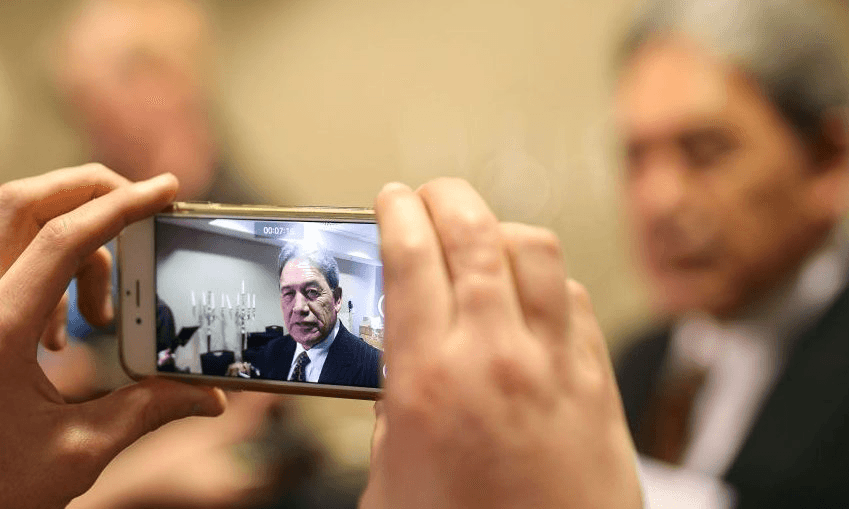Otago University law professor Andrew Geddis explains why authorities are so interested in what the NZ First Party did with donations to the ‘NZ First Foundation’.
Political donation scandals, it would seem, are like Wellington buses. You can spend years impatiently waiting on one, then along come a couple in quick succession.
Because, hot on the heels of the Serious Fraud Office’s announcement that it is laying charges against four people in relation to donations made to the National Party, the Electoral Commission has just issued the following press release:
Based on the information available, we have formed the view that the New Zealand First Foundation has received donations which should have been treated as party donations for the New Zealand First Party. In the Commission’s view, the donations were not properly transmitted to the Party and not disclosed as required by the Electoral Act 1993.
The Commission does not have the investigative powers to form a view about whether this failure to transmit and the non-disclosure means offences have been committed. These matters have therefore been referred to the New Zealand Police, which have the necessary powers to investigate the knowledge and intent of those involved in fundraising, donating, and reporting donations.
Let me start by saying that I am not in the least surprised by this development. Not. In. The. Least.
Contrary to Winston Peter’s assertions to the contrary, I know evidence when I see it. And the documentary material that Guyon Espiner shared with me for his RNZ stories here and here revealed something very unusual taking place.
In short, the material appeared to show people with involvement in running the NZ First Party accepting donations intended to help that party, banking them into a “New Zealand First Foundation” account separate from the party proper, then using that money to pay for party costs. But because those donations hadn’t made it into the NZ First Party’s account, the NZ First party secretary hadn’t reported them to the Electoral Commission.
Even given the possibility I wasn’t seeing the whole picture, and even accounting for law’s inherent uncertainties, it was very hard to see how this activity could comply with the Electoral Act 1993’s mandates. Which is what the Electoral Commission has now concluded, having examined the matter for itself.
As such, consistent with its obligations under the Electoral Act, it has sent the matter on to the police for them to look at. And given the way the police handled the allegations relating to the donation to the National Party, it is also no surprise that they immediately have referred the matter on to the Serious Fraud Office.
It is, of course, up to that investigative body to decide whether any criminal charges ultimately will be laid. But what can we deduce from the Electoral Commission’s decision to refer the matter on for further investigation, bearing in mind that it is only to do so where it “believes that any person has committed an offence” against the Electoral Act?
First of all, the commission expressly says it has concluded that the money given to the NZ First Foundation was really a donation to the NZ First Party. That seems pretty much a no-brainer to me, given the statutory definition of “party donation”:
a donation (whether of money or of the equivalent of money or of goods or services or of a combination of those things) that is made to a party, or to any person or body of persons on behalf of the party who are involved in the administration of the affairs of the party … .
Remember that one of the NZ First Foundation’s trustees is Brian Henry, who is NZ First’s judicial officer. And bolstering a conclusion that these are “party donations” is evidence from donors that they thought the money being paid into the foundation’s bank account was a donation to the NZ First Party itself.
If the donations to the NZ First Foundation are party donations (as the commission thinks), then the Electoral Act required that they be “transmitted” (i.e. handed over) to the NZ First Party’s secretary. This apparently never happened; indeed, the party secretary publicly has sought to disassociate herself from the foundation’s activities.
Unfortunately, that doesn’t mean the secretary is off the hook. Because, if the money paid into the NZ First Foundation’s account are party donations, then they ought to have been disclosed to the Electoral Commission. And as they weren’t, then the party secretary is responsible for that failure unless she can prove she didn’t mean hide the facts and “took all reasonable steps in the circumstances to ensure that the information … was accurate.”
Which is something that I suspect the SFO will be very interested in; not only who in the party knew what, but also who in the party ought to have been asking more questions. Because this is one area of the law where ignorance really is no excuse.

